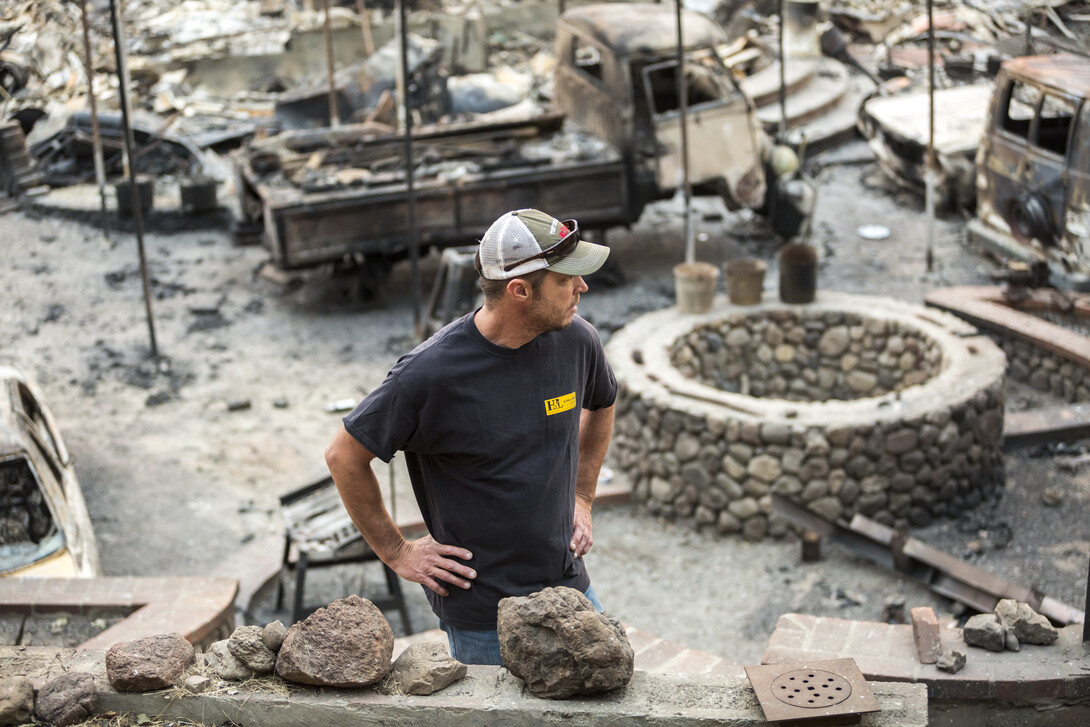
Nebraska’s Denise Bulling is helping with the psychological impacts of wildfires that have decimated much of northern California.
In recent weeks, Bulling, a senior research director and licensed mental health practitioner at the University of Nebraska-Lincoln’s Public Policy Center, has taught disaster psychological first aid to community volunteers from six counties in California. She is a certified disaster mental health trainer for the federal government’s Substance Abuse and Mental Health Services Administration, which was deployed by the Federal Emergency Management Agency when a natural disaster was declared.
“Communities are resilient, so we focus on building on those strengths,” Bulling said. “My job is to prepare the crisis counselors to support that resiliency.”
Even without the most recent blazes factored in, 2017 has been California’s most destructive year ever for wildfires. The record-setting year is due in large part to wildfires two months ago which killed 44 and caused more than $9 billion in property damage. The people in those communities are just beginning to rebuild their lives and livelihoods.
Bulling’s expertise as a behavioral health expert in disaster psychological first aid is helping with the recovery. Through her training, which emphasizes reducing stress and fostering coping skills, the volunteers are learning how to understand and recognize the mental health effects of a disaster. The lessons also focus on the importance of self-care and how to navigate resources that may be needed as a community rebuilds.
“Our mantra is ‘Connection is Protection,’ so we connect them to resources, to information, and to each other,” Bulling said. “Most people are going to be fine with a little bit of education about the common reactions to this very uncommon event.”
Like grief, there is a cycle to overcoming loss and devastation after a disaster. First, Bulling said, there are the heroics and meeting the immediate needs of safe shelter and food and water. That is often followed by a “honeymoon period,” where survivors are thankful for having been rescued or escaping safely. But soon, disillusionment sets in, Bulling said, and the community collectively gets frustrated and tired of the recovery.
“We educate people that there are phases in recovery and there are common reactions,” Bulling said. “It’s not unusual to experience those reactions and we give them the tools that will help them cope.”
Through a state-university partnership, much of the human infrastructure that Bulling helped put in place in California is already at work in Nebraska. The Public Policy Center has worked hand-in-hand for more than 15 years on disaster preparation with various state entities, such as Nebraska Emergency Management Agency, county officials, physical and mental health regions, and the Department of Health and Human Services. The center has been instrumental in developing the state’s disaster training curriculum and messaging for first responders, public information officers, behavioral health professionals and community volunteers. And because of the knowledge, preparation and relationships already in place, Nebraska is better equipped to handle disasters than many other states, Bulling said.
“We almost serve as an extender of those agencies,” Bulling said. “When the state’s resources are overwhelmed in responding, we can augment their resources and assist them because we’re subject matter experts, and we’ve already worked with them in planning.”







